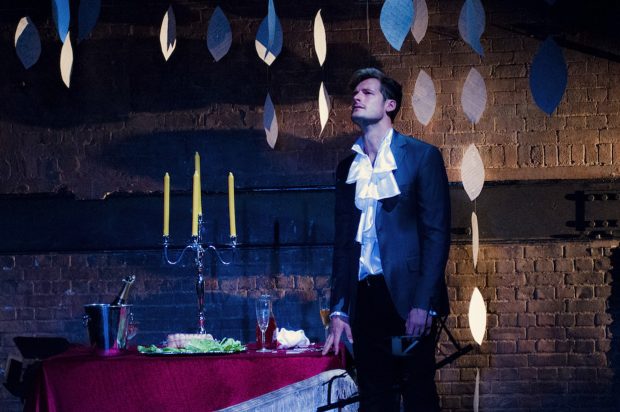Mozart & Salieri
Grimeborn, Arcola Theatre, until 13 August
I have been a fairly conscientious reviewer of Dalston’s Grimeborn festival for the last eight years. The name is less suitable now than it was. The Arcola Theatre, where the operas are performed, is now only a stone’s throw from Dalston Square, with its chic apartment blocks and bars and the resplendent C.L.R. James library, and the whole neighbourhood is upwardly mobile.
The Arcola itself remains a ramshackle place, and you can expect the usual late start, inadequate provision of programmes, and general air of administrative amateurism. This year’s season began on 23 July, and runs till 8 September. Some of the operas are familiar, though likely to be staged in an unusual way, and with drastically reduced accompaniment. So far this year I have seen Rimsky-Korsakov’s rare Mozart & Salieri. It is a setting of one of Pushkin’s ‘little tragedies’, and may be responsible for the despicable and in all ways deplorable play and film Amadeus, though Salieri is portrayed as more sympathetic here.
The programme states that ‘this immersive character of the production aims to put the audience in the centre of the action’, but it seemed just like Arcola’s usual productions to me: the steeply raked seating stops just short of the performance area, but that is common to everything done there, and indeed to other shoestring companies. It’s a fine production, but no more ‘immersive’, whatever that may be, than I am used to in many theatres.
To update Mozart and Salieri, as this production does, with Salieri wearing casual contemporary clothes, and Mozart dated only by a periwig, seems silly, but the contemporary operatic climate inures one to that. Salieri is taken by Nick Dwyer, a baritone whose operatic experience is immense, and who is one of the clearest enunciators of text I have ever heard – the opera is performed in English. He has a strong, attractive voice too, and altogether gave a most convincing account of the role.
Roger Patterson Mozart is less appealing, as of course he is meant to be. But Patterson has the kind of small insubstantial tenor for which I can’t see a big future. He acts well, and the work turns out to be thoroughly gripping, with a strong text and appealing pastiche music. The scene in which Mozart joins the pianist in playing the opening of the Requiem had me in tears, as it did Salieri. The accompaniment is provided by a pianist, Andrew Charity, who is also responsible for the translation, and is a most experienced performer in fringe opera, and by a viola and clarinet, which turns out to be an excellent combination.
This is one of Grimeborn’s more striking rediscoveries, and very well worth seeing.






Comments